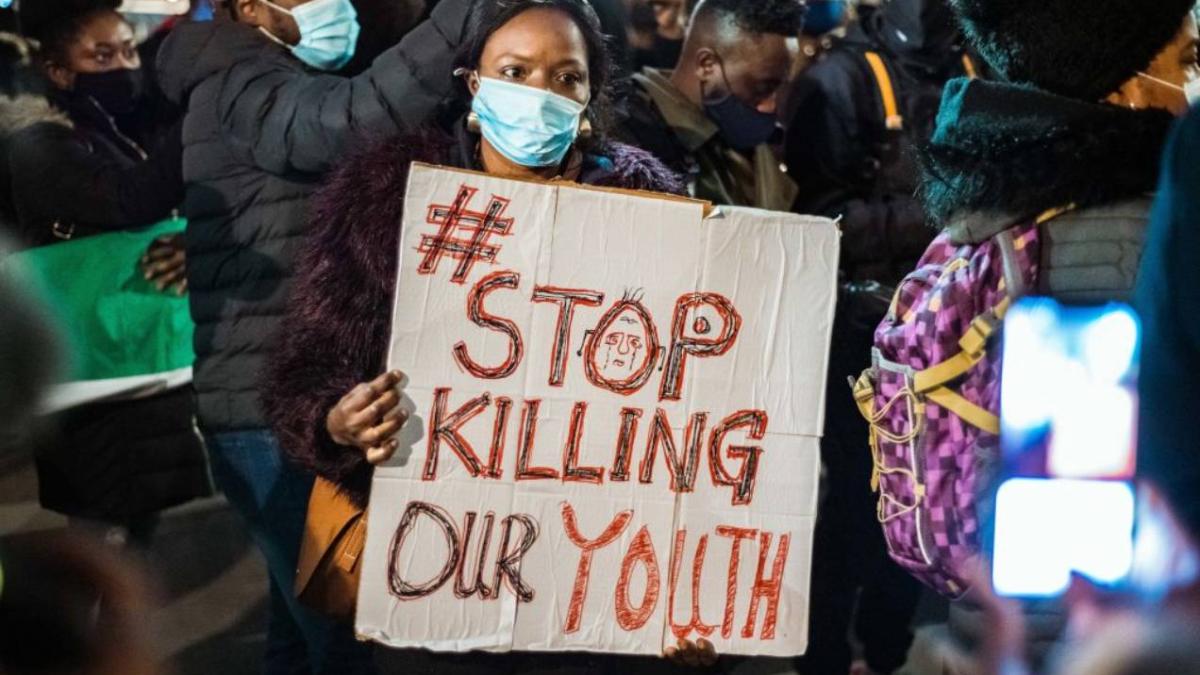
If you’ve been on social media in the last few days, you’ve probably seen at least a post or two about the SARS protests, or one of those aesthetically pleasing infographics about what’s going on in Nigeria. But if you haven’t had a chance to actually read up on it, it can seem really confusing and hard to understand.
*Warning* many posts under the #EndSARS hashtag are particularly graphic and violent. Even if you’re usually not impacted by blood on your feed, I implore you to think about it before you do a social media deep-dive, because some of the images being shared are incredibly confronting.
So let’s break it down so you’re not *that* friend who doesn’t know what’s going on around the world.
What Is SARS?
Not to be confused with the SARS virus, SARS is the Special Anti-Robbery Squad. It’s a controversial Nigerian police department (ACAB) that, in theory, was meant to investigate serious crimes like armed robbery, kidnapping, assault and murder.
It’s been around for more than a quarter of a century, and in that time it has become more well known for being abusive and violent than for, you know, doing good for the country.
Basically, SARS has been responsible for numerous instances of police brutality, and the officers in question seemingly don’t face repercussions for their actions. It’s essentially a textbook case of police officers being given way too much power with very little accountability, but x100.
When Did The SARS Protests Start?
Nigerian activists have been campaigning against SARS since 2018 by kicking off the #EndSARS movement which highlighted all of the horrific abuses at the hands of the organisation.
Organisations like Amnesty International have been working hard to spread the word about SARS since 2018, while helping provide much-needed resources for those protesting on the front line in Nigeria.
But it all sort of came to a head in June 2020 when Amnesty International released a report that found a whopping 82 cases of *documented* police brutality between 2017 and 2020 in Nigeria. As you can expect, that number is probably much higher when you account for everything that wasn’t recorded.
“Detainees in SARS custody have been subjected to a variety of methods of torture including hanging, mock execution, beating, punching and kicking, burning with cigarettes, waterboarding, near-asphyxiation with plastic bags, forcing detainees to assume stressful bodily positions and sexual violence,” the report reads.
“Findings from our research indicate that few cases are investigated and hardly any officers are brought to justice on account of torture and other ill-treatment.”
What Are They Calling For?
Before we get into the actual situation right now, it’s important to understand what they’re actually protesting for. End SARS activists are fighting for five core demands:
- Justice and appropriate compensation for the families of victims of police brutality
- Immediate release of protestors currently in custody
- Retraining and psychological evaluation of SARS officers before they are redeployed to other police units
- An independent body to oversee investigations into police brutality within 10 days of it happening
- Increased wages for police officers that protect citizens
But Didn’t Nigeria Get Rid Of SARS?
To put it simply, yes. Nigeria’s Inspector General of Police, Mohammed Abubakar Adamu announced that SARS would be disbanded on October 11 of this year, with Nigerian President Muhammadu Buhari saying in a video message that he heard the “genuine concerns” of the Nigerian people.
“We will also ensure that all those responsible for misconduct or wrongful acts are brought to justice,” Buhari said.
“The vast majority of men and women of the police force are hard-working and diligent in performing their duties.”
The disbanding of SARS is only the first step in our commitment to extensive police reforms in order to ensure that the primary duty of the police and other law enforcement agencies remains the protection of lives and livelihood of our people. pic.twitter.com/XjQMSr3jlm
— Muhammadu Buhari (@MBuhari) October 12, 2020
So… Why Is Everyone Still Protesting?
As you’d expect, it’s not as simple as just disbanding SARS.
Amnesty International, which has been vocal about the situation in Nigeria since 2018, doubts Nigeria will see any real change as a result of the supposed disbanding.
“Nigerians are skeptical of authorities’ pledge to end police atrocities because the past claims of reforming SARS have turned out to be empty words,” Amnesty International wrote in a statement.
Since his announcement, the president has been silent, and a new SWAT unit has been introduced. However, many protesters fear that the old SARS officers will simply switch departments without any rehabilitation or training.
What’s Happening In Lagos, Nigeria Now?
On Tuesday night, security forces began firing live rounds of ammunition at protesters at Lekki toll gate, BBC News reports. By Wednesday, Amnesty International reported that at least 12 people had died as a result of the violence. This is when it *really* started to get media attention.
Just for clarity, *this* situation wasn’t at the hands of the SARS officers, rather, at the hands of the security team that was hired to restore order in Lagos.
At this point, the protests themselves had been going on for months, but were overwhelmingly peaceful up until Tuesday night after several high-ranking government officials released statements about how the protesters were turning political and it was becoming “anarchy.”
But despite Amnesty International’s figures, the Lagos government has since denied the deaths, claiming that it was a result of “forces beyond our direct control.”
Protests have sporadically continued since, with damage to the property of those closest to the president on Wednesday night. As a result, the Nigerian military has warned protesters that they are ready to deploy in Lagos if needed to restore law and order.
How Can I Actually Help Fight Against SARS?
Whenever there’s a big international crisis, your feed gets flooded with “Here’s What’s Happening In XYZ; A Thread” and infographics sharing outrage that nobody is talking about whatever crisis we’re dealing with at that current moment in time. But it can be really hard to know how to actually help, especially when it comes to overseas political-fuelled issues where your financial help can easily end up in the wrong hands.
So what can you actually do?
- For starters, you can send an email via Amnesty International to President Muhammadu Buhari and Attorney General Abubakar Malami demanding police reform in Nigeria. This is easy, free and takes literally two seconds. If you’ve made it this far, I implore you to at least do this.
- You can educate yourself on the situation and help spread information here.
- If you’d like to financially help, you can do so via this resource hub, which has verified the authenticity of all donation points listed. However, it’s worth noting that most donation hubs have stopped accepting funds after the president’s curfew order, citing the safety of protesters as their top concern.



